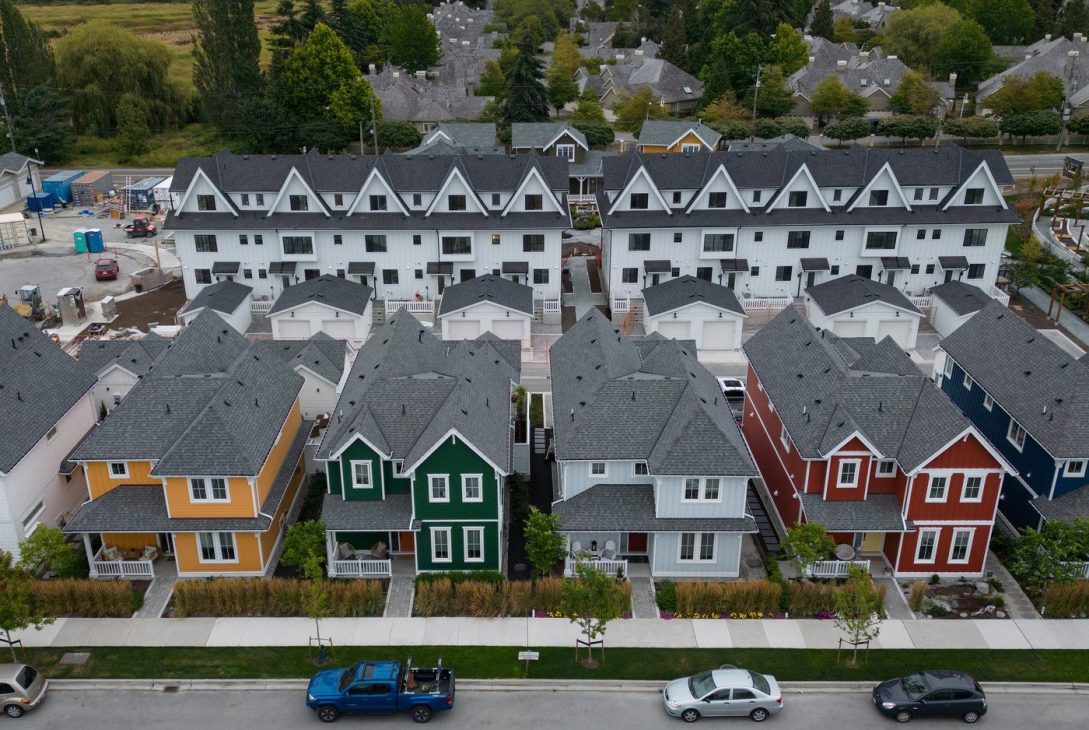By Craig Lord
Gregor Robertson, the former mayor of Vancouver who was elected to the House of Commons in April, sparked the debate after he was sworn in as housing minister earlier this, when a reporter asked him whether he thinks home prices need to fall.
“No, I think that we need to deliver more supply, make sure the market is stable. It’s a huge part of our economy,” he said.
Robertson added that Canada lacks affordable housing and championed Ottawa’s efforts to build out the supply of homes priced below market rates.
Mike Moffatt, founding director of the Missing Middle Institute, had a different answer when asked whether housing can be made more affordable for the average Canadian without a drop in market values.
“The short answer is no. It’s simply not possible to restore broad-based affordability to the middle class without prices going down,” he said.
Moffatt crunched the numbers last month on how long it would take for housing to return to 2005 levels of affordability if the average home price holds steady while wages grow at a nominal pace of three per cent annually.
Across Canada, he said, it would take 18 years to return to more affordable home price-to-income ratios — while in Ontario and British Columbia it would take roughly 25 years.
In B.C. and Ontario, Moffatt said, wages and home prices have become so detached from one another that it’s not “realistic” to rely on wage growth to catch up to housing costs.
While Moffatt said he welcomes policies that encourage more housing for vulnerable Canadians and those experiencing homelessness, efforts to build more below-market housing units won’t address the “middle-class housing crisis.”
Days after Robertson weighed in, Prime Minister Mark Carney was asked the same question. Rather than offering a yes-or-no answer, he asserted instead that he wants “home prices to be more affordable for Canadians.”
He cited Liberal election campaign pledges to drop the GST on new homes and offer incentives to municipalities to cut development charges in half.
The Liberals are looking to lower the cost of homebuilding with the aim of doubling the pace of housing starts in Canada. The government wants to scale up the use of prefabricated parts and other technological advances to streamline housing development.
Carney said that this boost in supply would “make home prices much lower than they otherwise would be.”
Moffatt said he agrees that lowering the cost of homebuilding would help to make homes more affordable.
In fact, he said, if the cost of building doesn’t go down and if home prices stagnate or decline, development will immediately cease to be profitable for builders, causing housing starts to dry up.
“I think that should be the primary focus of all three orders of government … figuring out how we can reduce the cost of home construction in order to create affordability and to lower prices,” he said.
Concordia University economist Moshe Lander agrees with Moffatt that home prices must come down if the government hopes to see broad affordability restored to the market over the next generation.
But he also questions whether the federal government should be the arbiter of housing affordability in the first place, given that so many of the political decisions are out of its control.
Lifting regulatory barriers to boosting supply is largely a matter for provincial and municipal governments, as are efforts to encourage more students to develop skills in the trades.
“And so for the federal government to say, ‘We’re going to try and incentivize this,’ I think they’re going miss the mark in whatever they’re trying to do because really, at the end of the day, it’s not their issue,” Lander said.
Lander said he also understands why politicians of all stripes are reluctant to come out in favour of lowering home prices.
Any explicit government effort to bring down housing prices down would be seen as an attack on homeowners’ equity — an asset many use to fund retirements or other long-term savings as they pay off their mortgages.
“Homeowners will not accept it,” Lander said. “And you risk alienating a very sizable and influential voting bloc.”
At the local level, he said, politicians tend to seek the support of homeowners because — unlike renters — they tend to stay put in a riding or district.
Lander said that most efforts to win renters’ votes tend to be “tepid” at best and “counterproductive” at worst. Policies that target the demand-side of the equation — helping Canadians become homeowners — tend to put upward pressure on home prices at the same time, he said.
Lander said part of the path to affordable housing has to be a shift away from the narrative that Canadians have been fed for generations — that home ownership is a lofty goal to aspire to and renters are “second-class citizens.”
“I don’t think that we’re being clear with society that this is what that might look like,” he said.
affordability Canadian home prices home prices housing affordability Mark Carney Missing Middle Institute real estate market The Canadian Press
Last modified: May 24, 2025











Affordability is determined by three main factors. Not just prices and incomes, but also interest rates.
For two decades, interest rates trended downwards. That created affordability space in which home prices could increase. In consequence, in the most expensive communities, prices are now consistent with interest rates of about 3%. The Bank of Canada has a big role to play in the future of our housing markets.
I do not want to get on a rant here…but artificially forcing home prices to fall is a ridiculous solution to a problem brought on in part by our own government policy’s. I do not point the finger exclusively at the federal government but many policy’s not created with a centralized theme obviously do not work. Look at the BOC actions (look at the damage brought on through the inept “leadership” Tiff Macklem and the BOC imposed on to Canada these past 5 years). OFSI’s prohibitive or arbitrary policy created for the sake of new policy to justify the departments need, , Ministry of finance policy, even mentioning to your fellow ministries about plans to increase immigration significantly, might play a part in allowing Canadians to afford a home.
Canada could also refocus on what the CMHC is and what its role should be.
” CMHC’s mandate evolved to include promoting affordability, choice, and access to housing finance for all Canadians. ” This mandate I suggest has been discarded.
CMHC has been turned into a cash cow for the federal government delivering over $1 billion to the federal government coffers in 2024. CMHC was to allow or offer Canadians access, or a path forwards,, for ALL Canadians to be able to purchase a home. This mandate has been long forgotten. CMHC is necessary for many Canadians today to allow them into the real estate market without the need of 20% down payments, which for almost any new home buyer would be next to impossible. At the same time the cost of this insurance has become prohibitive to those same home owners.
So lets recognize what the CMHC fee is…A tax on Home Buyers with an explanation that makes it palatable to the public.
Underwriting is indeed needed. But should those policy’s be more onerous then the underwriting policy’s that the banks themselves have implemented? CMHC was established to facilitate and represent Canadian’s interests and betterment.
Insurance fee’s too are prohibitive. Yes, the federal government is guaranteeing these mortgages ultimately. And yes, protecting Canadians interests against a sudden upturn in defaults that those very Canadians ultimately would have to pay is important. At the same time, CMHC has become a for profit entity for the government, that the government itself gets to regulate thus insuring that CMHC will continue to be needed, and will continue to offer a huge income for the federal government. We know the reserves that CMHC always had, We know the additional and un-needed additional funds imposed by the federal government largely through OSFI. At the same time, Should the worst happen, and the federal government (and Canadian’s) find itself responsible for a huge increase in defaults, we all know that policies can be re-written allowing people time to re-establish themselves. Only a massive shock to the system could endanger that many properties and the mortgage market in particular. This crisis could often, as we have witnessed so many times, is often made worse by the very action’s of the government and its various departments (CMHC, OFSI, lack of leadership from our so called elected leaders who keep accepting a salary from Canadians)
Lord knows the USA induced financial crisis of 2008-2009 which started in the housing sector and spread around the world could have easily been dealt with to reduce the strain on institutions. But a few at the levers of power had huge opportunities to make billions in allowing the housing sector to crash the economy.
The answer to the housing affordability crisis is not to subject Canadian homeowners to Billions in losses. Let us make the CMHC work for Canadians once again.
I might ask, who decided that mortgages HAD to be paid off in 25 years? Are there not better solutions? We know there are better answers, but Ottawa refuses to allow Canadians to utilize these solutions.
Rules that the CMHC has established, or has to enforce for for other regulators, can be huge obstacles to home buyers.
-Down payment regulations can costs Canadians 10’s of 1000’s of dollars before they can even think about purchasing. If you want housing to be affordable, lets make it more affordable to purchase, not add onto the costs.
– OFSI imposed the “qualifying rate” upon Canadians. support or hate the qualifying rate, it is an artificial number and HAS reduced Canadians buying power by what? 18% – 20% ? Want to make housing affordable, do not impose a solution were Canadian home owners have to suffer a loss.
Stop reducing Canadian affordability. Worried about the cost of rate increases? 1st time home buyers can be protected by enforcing a policy of the need to take a 5 year fixed term as the 1st term of their mortgage. That ensures stability for those 5 years. In 5 years, earning should have increased. Or CMHC could step in and ensure that lenders cannot offer a renewal that is unreasonable and could lead to foreclosure. Or offer insurance that helps Canadians afford a huge increase in mortgage payments. I think most people would welcome a $100 a month insurance fee that stops the mortgage renewal from doubling their mortgage payment.
I have scraped the surface here. Even offered overly simplified solutions. BUT I was trying to show there are solutions to housing affordability that do not necessitate Canadians losing $ billions in home equity, or in real world language…people’s wealth. To follow that path will lead to extraordinary damage to all Canadian’s.